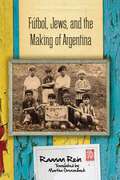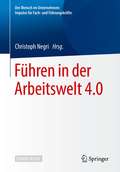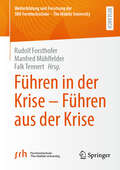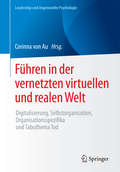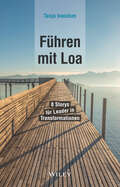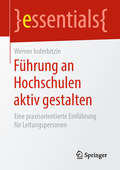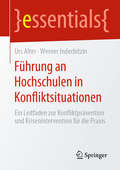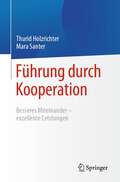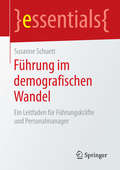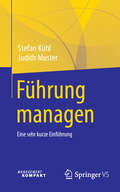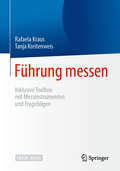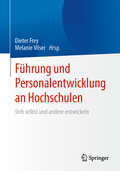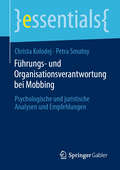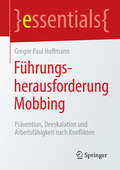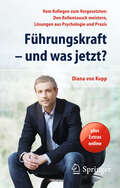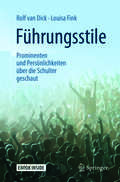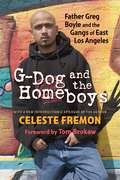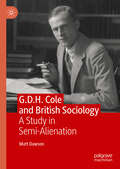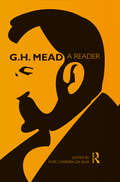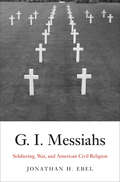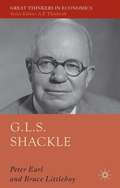- Table View
- List View
Fútbol, Jews, and the Making of Argentina
by Raanan Rein translated by Martha GrenzebackIf you attend a soccer match in Buenos Aires of the local Atlanta Athletic Club, you will likely hear the rival teams chanting anti-Semitic slogans. This is because the neighborhood of Villa Crespo has long been considered a Jewish district, and its soccer team, Club Atlético Atlanta, has served as an avenue of integration into Argentine culture. Through the lens of this neighborhood institution, Raanan Rein offers an absorbing social history of Jews in Latin America. Since the Second World War, there has been a conspicuous Jewish presence among the fans, administrators and presidents of the Atlanta soccer club. For the first immigrant generation, belonging to this club was a way of becoming Argentines. For the next generation, it was a way of maintaining ethnic Jewish identity. Now, it is nothing less than family tradition for third generation Jewish Argentines to support Atlanta. The soccer club has also constituted one of the few spaces where both Jews and non-Jews, affiliated Jews and non-affiliated Jews, Zionists and non-Zionists, have interacted. The result has been an active shaping of the local culture by Jewish Latin Americans to their own purposes. Offering a rare window into the rich culture of everyday life in the city of Buenos Aires created by Jewish immigrants and their descendants, Fútbol, Jews, and the Making of Argentina represents a pioneering study of the intersection between soccer, ethnicity, and identity in Latin America and makes a major contribution to Jewish History, Latin American History, and Sports History.
Führen im Zeitalter neuer Arbeitswelten: Potenziale realisieren und Erfolgsfaktoren umsetzen
by Sandra GauerDen Weg zu innovativen Arbeitswelten prägt der Mut, aktuelle Denkmuster zu durchbrechen! In diesem architektur- und wirtschaftspsychologischen Buch tauchen Sie tief in neue Arbeitswelten und die daraus entstehenden Anforderungen an die Führung ein. Es werden die komplexen Herausforderungen der Führung in New Work-Umgebungen ebenso beleuchtet, wie die verborgenen Potenziale. Die Chancen und Risiken unserer physischen, psychischen und digitalen Arbeitswelt in Bezug auf unser Erleben und Verhalten sind in diesem Buch ebenfalls ein wichtiger Bestandteil. Es zeigt auf, wie Menschen neue Arbeitswelten für sich entdecken und wertschöpfend für Ihre Tätigkeiten und Bedürfnisse nutzen können. Anschaulich stellt die Autorin dar, , wie eine transformationale, emotional intelligente Führung die ständigen Veränderungen und neuen Anforderungen erfolgreich meistern und Gesundheit fördern kann. Zudem wirft das Buch einen kritischen Blick auf die aktuellen Strategien zum Workplace Changeund die Ansprüche, die an Führungskräfte gestellt werden. Die zentrale Frage ist unvermeidlich: Was bedeutet „den Menschen in den Mittelpunkt stellen“, und welche Konsequenzen hat es, wenn wir es nicht tun.Zielgruppen: Dieses Buch wendet sich an Führungskräfte, die die Chancen und Potenziale der Führung in modernen Arbeitswelten für sich nutzen wollen. Doch auch für Mitarbeiter und Interessierte bietet es faszinierende Einblicke in die Themen New Work und Leadership. Denn letztendlich erfordert die neue Arbeitswelt das Verständnis und Engagement von jedem Einzelnen von uns.
Führen in der Arbeitswelt 4.0 (Der Mensch im Unternehmen: Impulse für Fach- und Führungskräfte)
by Christoph NegriDieses Praxisbuch bietet einen Überblick über die psychologischen Aspekte der Führung und Entwicklung in der Arbeitswelt 4.0. Es enthält praxisrelevante, augenöffnende Beiträge wie z.B.:Menschen in der Arbeitswelt 4.0Digitale LeadershipTeamentwicklung in der digitalen ArbeitsweltPsychologischen Grundlagen agiler ArbeitsmethodenPersonalentwicklung und Lernen in der Arbeitswelt 4.0Identität in der Arbeitswelt 4.0Design Thinking zur Entwicklung innovativer WeiterbildungenLeistungssteuerung und Selbstregulation als Kernkompetenz in der Arbeitswelt 4.0. Neben realen Best-Practice-Fällen aus verschiedenen Branchen kommen Expertinnen und Experten in Interviews zu Wort, neueste wissenschaftliche Erkenntnisse von aktuellen IAP-Forschungsergebnissen werden für Anwender/innen aufbereitet und relevante, praxisdienliche Hinwiese beschrieben. Praktiker/innen finden in diesem Band Grund- und Anwendungswissen in kompakter und leicht verständlicher Form. Die ZielgruppenFach- und Führungskräfte, Geschäftsführer/-innen, Personalentwickler/-innen, HR-Manager/-innen, Berater/-innen und alle an den Entwicklungen zur Arbeitswelt 4.0 interessierten Personen.Der HerausgeberProf. Dr. Christoph Negri ist Leiter des IAP Institut für Angewandte Psychologie an der ZHAW Zürcher Hochschule für Angewandte Wissenschaften. Seit 2015 führt er am IAP verstärkt neue Entwicklungen im Bereich Lernen und Lehren ein und treibt den digitalen Wandel in Weiterbildung und Dienstleistung voran.
Führen in der Krise – Führen aus der Krise (Weiterbildung und Forschung der SRH Fernhochschule – The Mobile University)
by Manfred Mühlfelder Rudolf Forsthofer Falk TennertDas Ziel dieses Buches ist es, das Thema „Krisenführung“ aus verschiedenen psychologischen Perspektiven zu betrachten. Krisen sind durch drei Merkmale gekennzeichnet: Existenzielle Bedrohung von Menschen, Gruppen und Organisationen Dringlichkeit und Notwendigkeit von Verhaltensänderungen Hohe zeitliche Dynamik, Unvorhersehbarkeit und Agilität der Krisenereignisse Es werden verschiedene Facetten des Führungshandelns in Krisensituationen sowohl aus der Perspektive der Führenden als auch der Geführten beleuchtet und Handlungsempfehlungen für Führungskräfte zur Mitarbeiter- und Teamführung in akuten Krisen abgeleitet.
Führen in der vernetzten virtuellen und realen Welt
by Corinna Von AuDer vorliegende achte Band der Reihe Leadership und Angewandte Psychologie beleuchtet insbesondere den bedeutenden Aspekt der Digitalisierung in der VUCA-Welt, der unter anderem zur Erfordernis einer Selbstorganisation des „lebenden“ Organisationssystems mit seinen wechselseitigen, in nicht linearen Austauschbeziehungen stehenden Organisationsmitgliedern führt. Hierbei wird auch auf bedeutende Organisationsspezifika – wie unter anderem Wissenschaft und öffentliche Verwaltung – sowie auf das Tabuthema „Tod und Trauer“ in Organisationen eingegangen.
Führen mit Loa: 8 Storys für Leader in Transformationen
by Tanja IneichenWir leben in einer Zeit des Übergangs - das Alte ist noch nicht weg, das Neue schon da. Bisherige Hierarchien, Strukturen, Werte und Handlungsweisen existieren parallel zu New Work und einer Aufbruchstimmung, die Augenhöhe, Achtsamkeit, Nachhaltigkeit und Sinn herbeisehnt. Menschen in Führungsrollen erleben in dieser Situation viel Verunsicherung. Es ist ihr Auftrag, im Außen Transformation zu gestalten und Orientierung zu geben, während sie im Inneren mit ihrer eigenen Transition und der Adaption an neue Bedingungen ringen. Das Buch von Tanja Ineichen vermittelt seine augenöffnende und ermutigende Botschaft anhand von acht Szenarien aus der heutigen Businesswelt. In jedem Kapitel wird ein Case im Rahmen einer Story erzählt. Im Mittelpunkt stehen dabei Führungskräfte, die in einem Dilemma zwischen zeittypischen Polaritäten gefangen sind. Sie wissen in einer sich zuspitzenden Situation nicht mehr weiter. Deshalb wenden sie sich an Loa, die ihnen weise einen Weg zur Lösung zeigt. "Führen mit Loa" - das sind acht abgeschlossene Erzählungen mit unterschiedlichen Protagonisten und Protagonistinnen aus verschiedenen Ländern und aus Unternehmen unterschiedlicher Größen. Jede Erzählung beginnt mit einem spannend erzählten Grundkonflikt, der die jeweilige Hauptfigur an einen Punkt bringt, an dem es scheinbar keine befriedigende Lösung mehr gibt. Durch eine "magisch-realistische" Fügung wird sie auf Loa aufmerksam und trifft sie entweder an einem Ort mitten in der Natur oder in einer Stadt mit besonderem Flair. Im Dialog mit Loa findet sich schließlich die Lösung - mithilfe einer stets gleichen dialogischen Struktur, die die Lesenden lernen, auf ihre eigenen Themen anzuwenden.
Führung an Hochschulen aktiv gestalten: Eine praxisorientierte Einführung für Leitungspersonen (essentials)
by Werner InderbitzinWerner Inderbitzin stellt in diesem essential in prägnanter Form dar, dass an Hochschulen ein gemeinsames Ziel entwickelt und der Weg dahin konstruktiv gestaltet werden kann, wenn wichtige Regeln beachtet werden. Von einem Praktiker für die Praxis geschrieben, geht er den folgenden Fragen nach: „Welche Art von Führung soll es sein? Welcher Führungsstil ist Hochschulen angemessen, welcher nicht?“ Führung an Hochschulen ist herausfordernd und oft frustrierend – aufseiten aller Angehörigen des Lehr- und Forschungsbetriebs. Der Autor möchte zu weiterführenden Überlegungen anregen und die konkrete Arbeit in der Praxis unterstützen.
Führung an Hochschulen in Konfliktsituationen: Ein Leitfaden zur Konfliktprävention und Krisenintervention für die Praxis (essentials)
by Urs Alter Werner InderbitzinDieses essential gibt Führungskräften an Hochschulen einen praxisorientierten Leitfaden zum Konfliktmanagement und zur Krisenintervention an die Hand. Dabei wird auf das Spezifische von Konflikten an Hochschulen fokussiert, weil die gängige Konfliktliteratur hier nur beschränkt weiterhilft. Leser/innen verstehen die speziellen Treiber von Konflikten in Hochschulen und erhalten konkrete Hinweise für Konfliktprävention und Umgang mit Konflikten. An ausgewählten Konfliktsituationen und -beispielen wird aufgezeigt, wie Führungsverantwortliche in einer Hochschulkultur lösungsorientiert und deeskalierend wirken können.
Führung durch Kooperation: Besseres Miteinander – exzellente Leistungen
by Thurid Holzrichter Mara SanterFührung ist herausfordernd und erfordert spezielle Kompetenzen, kluge Entscheidungen, angemessene Strategien und einfühlendes Geschick. Entscheidend ist, ob es Ihnen als Führungskraft gelingt, Ihre Mitarbeitenden mitzunehmen und eine funktionierende Zusammenarbeit aller Beteiligten zu erreichen.Das Buch „Führung durch Kooperation“ hilft Ihnen als Führungskraft erfolgreich zu sein, indem Sie die Kooperationsbereitschaft in Ihrer Organisation fördern. Es stellt Ihnen ein Führungsprinzip vor, das in besonderem Maß dabei hilft, Störungen und Widerstände in einem System zu identifizieren und diesen entgegenzuwirken und darüber hinaus das Miteinander positiv zu wandeln. Es bietet Ihnen wertvolle Erkenntnisse, um tieferliegende Gründe zu erkennen, warum manche Mitarbeitenden nicht im Sinne des Unternehmens agieren. Dadurch können Sie zielgerichtet eingreifen und Änderungen vornehmen. Präventiv kann es Sie unterstützen, Veränderungsprozesse erfolgreich zu gestalten, Konflikten vorzubeugen und Kommunikationsstörungen sowie Fluktuation von Fachkräften zu verhindern. Zielgruppen:Führungskräfte, Personalverantwortliche, Organisationsentwickler*innen und Berater*innen.Zu den Autorinnen:Thurid Holzrichter ist Diplom-Psychologin und Autorin mehrerer Bücher, Beraterin, Coach und Trainerin, sowie Gründerin des Netzwerkes HOLZRICHTER-BERATUNGEN. Der Schwerpunkt ihrer Arbeit liegt in der Beratung von Unternehmen, Bildungseinrichtungen sowie der Führungskräfteentwicklung. Sie ist unter anderem spezialisiert auf Generationswechsel in Unternehmen. Mara Santer ist Diplom-Psychologin und Mathematikerin, Beraterin, Coach und Trainerin, sowie stellvertretende Leitung des Netzwerkes HOLZRICHTER-BERATUNGEN. Sie berät Teams und Einzelpersonen in Unternehmen und Bildungseinrichtungen.
Führung im demografischen Wandel: Ein Leitfaden für Führungskräfte und Personalmanager (essentials)
by Susanne Schuett,,Wie Sie den Laden führen, wenn die Leute erst mit 75 in Rente gehen", so Peter Drucker einmal trefflich, ist die zentrale und zugleich schwierigste Management-Aufgabe der Zukunft. Dieses Essential unterstützt Führungskräfte und Personalmanager bei der Bewältigung dieser neuen Herausforderung - und zwar praxisnah und konkret. Es liefert eine kompakte Handlungsanleitung für ein effektives Führen im demografischen Wandel. Führungskräfte und Personalmanager haben jetzt die Chance, die schwierigste Lebenskunst im 21. Jahrhundert, unser neues Altern, im Sinne eines ,,Ready to Age" erfolgreich zu meistern, mitzugestalten und voranzutreiben.
Führung managen: Eine sehr kurze Einführung
by Stefan Kühl Judith MusterIn der Führungsdiskussion wird der Scheinwerfer bisher vorrangig auf Personen gerichtet. Es werden kleine interaktionelle Tipps und Tricks gegeben, mit denen man effektiver führen kann. Die Wirksamkeit dieser Vorgehensweisen sind jedoch begrenzt. In diesem Buch wird gezeigt, wie die Ausbildung von Führungsmöglichkeiten durch die Gestaltung von Organisationsstrukturen beeinflusst werden kann. Durch „gute Organisation“ können dabei Führungsnotwendigkeiten reduziert werden. Wer sinnvoll über Führung reden will, sollte deswegen über Organisation nicht schweigen.
Führung messen: Inklusive Toolbox mit Messinstrumenten und Fragebögen
by Rafaela Kraus Tanja KreitenweisDieses kompakte Fachbuch gibt Ihnen einen umfassenden Überblick über die wichtigsten Führungsansätze. Es enthält eine Toolbox mit mehr als 20 fundierten Messinstrumenten und Fragebögen, z.B. zu charismatischer, ethischer, narzisstischer oder psychopathischer Führung, die Sie auch für eigene Befragungen (z. B. Mitarbeiterbefragungen oder wissenschaftliche Studien) einsetzen können. Sie finden in diesem Werk Antworten auf Fragestellungen wie beispielsweise: Wie führt man Veränderungsprozesse zum Erfolg? Was macht authentische Führungskräfte so überzeugend? Ist es wirklich wahr, dass Frauen anders – oder sogar besser als Männer führen? Was macht toxische oder schlichtweg schlechte Führungskräfte so gefährlich? Lassen Sie sich anregen, Führungsverhalten in all seinen Facetten zu reflektieren, lernen Sie, wie man Führung messen kann und entwickeln Sie ganz nebenbei Ihre eigene Führungskompetenz weiter! Zielgruppen: Führungskräfte erhalten Inspiration und Orientierung für ihre eigene Führungspraxis, Studierende finden sich besser im breiten Feld der Führungsforschung zurecht und Praktiker aus dem Personalbereich können sich neueste Erkenntnisse der Führungsforschung aneignen. Zu den Autorinnen: Prof. Dr. Rafaela Kraus ist Professorin für Personalmanagement an der Universität der Bundeswehr München und Expertin für Leadership, Organisationsentwicklung und digitale Transformation. Tanja Kreitenweis ist wissenschaftliche Mitarbeiterin an der Universität der Bundeswehr München und forscht in den Bereichen Serious Gaming, Lernen, Change Management und Führung.
Führung und Personalentwicklung an Hochschulen: Sich selbst und andere entwickeln
by Dieter Frey Melanie VilserDer Hochschulalltag befindet sich im Wandel und stellt Führungskräfte und Mitarbeitende vor neue Herausforderungen. Dieses Buch vermittelt wertvolle psychologische Erkenntnisse, um diesen Herausforderungen zu begegnen. Dabei beantwortet es Fragen wie z.B.: Wie führt man? Wie schafft man Synergieeffekte in Teams? Wie wählt man gute Mitarbeitende aus? Wie führt man Mitarbeiter*innengespräche? Welche Feedbackkultur fördert Potenziale bestmöglich? Wie geht man mit Stress um? Basierend auf Trainings- und Beratungswissen für LMU Mitarbeitende erhalten Sie in diesem Buch langjährig erprobte alltagstaugliche Hinweise zum Aufbau wichtiger Kompetenzen wie Selbstführung, Mitarbeiter*innenführung, Personalauswahl und -entwicklung, Zeit- und Selbstmanagement, Stressmanagement und Achtsamkeit. Zielgruppen:Das Buch richtet sich an wissenschaftliche Mitarbeitende jeder Karrierestufe in Bildungseinrichtungen, an Professor*innen, Postdoktorand*innen wie auch Doktorand*innen. Im Mittelpunkt steht die kompakte Zusammenfassung des Kernwissens für eine gesunde und erfolgreiche Entwicklung der eigenen Potenziale sowie der Potenziale von Mitarbeiter*innen und Studierenden. Zu den Herausgeber*innen:Prof. Dr. Dieter Frey ist Leiter des LMU Center for Leadership and People Management und Mitglied der Bayrischen Akademie der Wissenschaften. Dr. Melanie Vilser ist wissenschaftliche Mitarbeiterin und Trainerin am LMU Center for Leadership and People Management.
Führungs- und Organisationsverantwortung bei Mobbing: Psychologische und juristische Analysen und Empfehlungen (essentials)
by Christa Kolodej Petra SmutnyChrista Kolodej und Petra Smutny zeigen Handlungsmöglichkeiten für Führungskräfte und Personalverantwortliche bei Mobbing in ihrem Einflussbereich auf. Mobbing wird als kontextbezogenes Phänomen vorgestellt, welches spezifische macht-, gruppen- und rollendynamische Prozesse aufweist. Es werden sowohl aus psychologischer als auch aus juristischer Sicht relevante Interventionen verdeutlicht. Das Buch wird mit praktischen Präventions- und Interventionstipps für Führungskräfte abgerundet, die aus Best-Practice-Beispielen von Führungskräften abgeleitet wurden.Die Autorinnen:Prof. Dr. Dr. Christa Kolodej, MA ist Pionierin der österreichischen Mobbingforschung und leitet seit 20 Jahren das Zentrum für Konflikt- und Mobbingberatung in Wien. Sie coacht Führungskräfte und Personalverantwortliche und unterstützt Unternehmen bei der Implementierung von Konfliktmanagementsystemen. Maga Petra Smutny, LL.M, ist Rechtsanwältin und eingetragene Mediatorin in Wien, Österreich, und beschäftigte sich als Richterin, Vorsitzende der Gleichbehandlungskommission und Autorin seit vielen Jahren mit den Themen Mobbing, Antidiskriminierung und Führungsverhalten.
Führungsherausforderung Mobbing: Prävention, Deeskalation und Arbeitsfähigkeit nach Konflikten (essentials)
by Gregor Paul HoffmannIn diesem Essential wird zunächst der Begriff Mobbing definiert und von anderen, ähnlich verwendeten abgegrenzt. Zudem skizziert der Autor die Entstehungsbedingungen von Mobbing-Geschehen und er formuliert unter Berücksichtigung der Konzepte der personalen und organisationalen Resilienz Schlussfolgerungen für die tägliche Führungsarbeit. Mobbing-Geschehen stellt immer eine Herausforderung für Führungskräfte dar. Im Zentrum der Aufmerksamkeit steht, wie Mobbing erkannt werden kann, wie Führungskräfte dazu beitragen können, die Arbeitsfähigkeit der Gruppe wiederherzustellen, und nicht zuletzt wie bereits präventiv gegen Mobbing gewirkt werden kann.
Führungskraft - und was jetzt?: Vom Kollegen zum Vorgesetzten: Den Rollentausch meistern, Lösungen aus Psychologie und Praxis
by Diana KoppDer Rollenwechsel vom Mitarbeiter zum Vorgesetzten ist eine der größten Veränderungen, die eine Berufskarriere bereit halten kann. Nicht wegen neuer fachlicher Anforderungen, sondern wegen zahlreicher, meist unvorhersehbarer Herausforderungen im psychologischen, kommunikativen Bereich! – Fühlen Sie sich auf diesen Rollenwechsel vorbereitet? Antworten Sie nicht zu schnell – schauen Sie lieber zunächst kurz in dieses Buch hinein! Denn es berücksichtigt verschiedene Persönlichkeiten und bietet Hilfestellungen, egal ob Sie eher vorsichtig oder forsch an die neue Aufgabe herangehen wollen.Das Buch ist in vier übersichtliche Hauptkapitel unterteilt: Selbstführung, Mitarbeiterführung, Umgang mit Vorgesetzten, Privatleben. – Denn dies sind die Bereiche, in denen frisch gebackene Führungskräfte Veränderungen erleben und auf unerwartete Stolperfallen treffen können. – Von der selbstbewussten Jung-Vorgesetzten, die ihre Mitarbeiter mit neuen Ideen überfordert, über den vorsichtigen Chef, der an seinen eigenen hohen Erwartungen verzweifelt bis hin zur hochveranlagten Oberärztin, die aufgrund langer Arbeitszeiten in den Konflikt mit der Familie gerät – sie alle finden Rat und praktische Tipps für den neuen Alltag. – Ganz praxisnah aufbereitet mit Fallbeispielen, Checklisten und Arbeitsblättern.
Führungsleben: Inside Leadership - Top-Manager im persönlichen Interview
by Uwe Böning Brigitte Fritschle Stefan Oefner-PyDieses Buch macht die psychologische Wirklichkeit des Führungsalltags in Unternehmen ungeschminkt sichtbar, indem es Top-Manager und Führungskräfte unterschiedlicher Bereiche sehr persönlich – manchmal anonym – zu Wort kommen lässt: Managerinnen und Manager aus den Branchen Energie, Industrie, Banking, Politik, Beratung, Architektur, Universität und Schule, Küche, Kunst und Kirche berichten in ausführlichen Interviews sehr authentisch, manchmal etwas „ungeschliffen“, aber immer sehr ehrlich aus ihrem „Führungsleben“, von den ersten Erlebnissen mit dem Phänomen Führung über schwierige (Grenz-)Erfahrungen und Misserfolge bis hin zu Erfolgserlebnissen und ihren ganz persönlichen Lernerfahrungen. Herausgekommen ist ein Kaleidoskop an realen Führungsgegebenheiten, die den Leserinnen und Lesern realistische Impulse geben und mit denen sich alle, die sich mit Führung befassen, auseinandersetzen müssen, ob gewollt oder nicht. Ein Buch für alle, die geduldig etwas tiefer hinter die Kulissen der Führungsetagen blicken möchten – jenseits der üblichen Werbebotschaften, Führungsratgeber und Erfolgsrezepte.
Führungsstark in Kindertageseinrichtungen: Wertschätzung als neues Erfolgsprinzip für Kita-Leitungen (essentials)
by Susanne Schuett Julia HitzenbergerDieses essential unterstützt Kita-Leitungen bei der Bewältigung der Belastungen am Arbeitsplatz Kita, die heute eine besondere Führungsstärke brauchen, um ihre Mitarbeiter/-innen, betreuten Kinder und Eltern durch die Wertschätzungskrise zu führen. Nach dem neuen Erfolgsprinzip „Mit Wertschätzung zu Wertschöpfung“ zeigen wir fünf konkrete Schritte, wie Kita-Leitungen ihre Mitarbeiter/-innen binden, qualifizieren, gesund erhalten, motivieren und zufriedenstellen – für eine Verbesserung des „Lebens und Arbeitens“ und der frühpädagogischen Qualität in Krippe, Kindergarten und Hort.
Führungsstile: Prominenten und Persönlichkeiten über die Schulter geschaut
by Rolf Van Dick Louisa FinkIn einer Zeit, die von Wandel und Veränderung geprägt ist, ist gute Führung entscheidend für den Erfolg – von Unternehmen, aber auch in der Politik oder im Sport. Aber wie sieht gute Führung aus?Der Leser bekommt mit diesem Buch exklusive Einblicke in die Praxis der Führung – nicht nur in Unternehmen, sondern in viele gesellschaftliche Bereiche: Von Kirche und Kunst über Journalismus und Militär bis zur Politik. Rolf van Dick hat mit herausragenden Menschen gesprochen, die in ihren Bereichen zu anerkannten Führungspersönlichkeiten zählen. Dazu gehören der Dalai Lama, Sara Wagenknecht, Birgit Prinz, Wolfgang Niedecken oder Günter Grass oder der ehemalige Bundespräsident Roman Herzog. Im Gespräch ist er diesen Persönlichkeiten – oft in ihrem Zuhause – nahe gekommen und hat faszinierende Geschichten gehört. Dieses Buch bietet eine inspirierende Auswahl der spannendsten Gespräche, in denen immer der Frage nach den ganz persönlichen Führungsstilen der Interviewpartner nachgegangen wird. Von der provokanten Frage angefangen, ob Führung überhaupt notwendig ist, diskutiert Rolf van Dick mit seinen Gesprächspartnern, warum Führung häufig schief geht, worauf es im 21. Jahrhundert ankommt und welche Werte für den Erfolg Aktualität haben. Auch die Frage, ob man Führung lernen kann oder dafür „geboren“ sein muss, wird sehr vielfältig beantwortet.Das Werk liefert Einsichten und bietet Anregungen sowohl für erfahrene Manager, als auch an Führung interessierten Einsteigern die eine Inspiration für ihren (Führungs-)Alltag suchen.
Für die Praxis gerüstet!?: Practice Readiness am Ende des Fachhochschulstudiums Gesundheits- und Krankenpflege in Österreich
by Ursula Halbmayr-KubicsekBei dem vorliegenden Band handelt es sich um eine qualitative Evaluationsstudie des Studienganges Gesundheits- und Krankenpflege an österreichischen Fachhochschulen.Der Pflegeberuf hat sich in den letzten Jahrzehnten weiterentwickelt und an Komplexität zugenommen. Um diesen Anforderungen gerecht zu werden, benötigen Pflegende unterschiedliche Kompetenzen und Fertigkeiten. Im Rahmen der generalistischen Pflegeausbildung an den Fachhochschulen sollen die Studierenden innerhalb von sechs Semestern diese gesetzlich geforderten Kompetenzen erlernen, um eine Practice Readiness zu entwickeln. Ziel dieses Forschungsprojektes war die qualitative Evaluierung hinsichtlich der Practice Readiness der Absolventinnen und Absolventen. Es fanden qualitative Befragungen von Studierenden der Pflege, Führungspersonen im basalen und mittleren Pflegemanagement sowie Berufseinsteigerinnen und -einsteiger statt. Aus diesen unterschiedlichen Perspektiven konnte die Practice Readiness der Fachhochschulabsolventinnen und -absolventen dargestellt werden.
G-Dog and the Homeboys: Father Greg Boyle and the Gangs of East Los Angeles
by Celeste FremonFather Gregory J. Boyle, SJ, is a native of Los Angeles, a Jesuit priest, and founder of Homeboy Industries, an economic development and jobs program begun in 1988 for at-risk and gang-involved youth. "A great many kids in my neighborhood don't plan their futures; they plan their funerals." G-Dog and the Homeboys presents the story of Boyle's unconventional ministry and its extraordinary successes. In this expanded, updated edition, Celeste Fremon has returned to East L.A. to report on gang members she first profiled fifteen years ago. Using their individual stories as models, she examines what policy makers should know about gang intervention now, years later.
G.D.H. Cole and British Sociology: A Study in Semi-Alienation
by Matt DawsonThis book explores G.D.H Cole’s significant yet often overlooked role in the history of British Sociology from 1920-1960. Eager to achieve a sense of scientific legitimacy following its institutionalisation in the early 1900s, British sociology had no space for a scholar like Cole, who saw sociology as an innately normative and political project which, in his case, was dedicated to the development of socialism. Conceptualising Cole's relationship to sociology as one of semi-alienation - suggesting an openness to the principles of the discipline yet disagreement with the form it takes in the current day - Dawson shows how Cole made a number of important sociological contributions which were grounded in an early form of structuration theory, including the production of one of Britain’s first sociology textbooks and an early monograph on the sociology of class. A passionate advocate for what sociology could be, Cole was a promoter of the sociological Marx and interrogator of Durkheim as part of his desire to develop sociology in Britain, including at his own institute of the University of Oxford. Cole also produced a distinctive corpus of public and creative sociology expressed in newspaper articles, poems and songs. Drawing on archival research Dawson reintegrates Cole into the history of British Sociology, and in so doing offers valuable insight into sociology's history and its contemporary form, emphasising a normative, critical and public form of the discipline.
G.H. Mead: A Reader (Routledge Classics in Sociology)
by G. H. MeadThis book introduces social scientists to the ideas of George Herbert Mead (1863-1931) - one of the most original yet neglected thinkers of early twentieth century sociology. Mead is an exceptional case amongst sociological classics in that, until now, there has been no comprehensive reader of his work. As the first one-volume, comprehensive edited collection of Mead’s published and unpublished writing, this book fills this gap. It is the first to critically assess all of Mead's writings and draw out the aspects that are central to his system of thought. The book is divided into three parts (social psychology, science and epistemology, and democratic politics), comprising a total of 30 chapters - a third of which are published here for the first time. G.H. Mead: A Reader provides a unique and timely contribution to the understanding of this key theorist. It is essential reading for both undergraduate and postgraduate students in the fields of sociology, social psychology, philosophy of social science, social and cultural anthropology, and social and political theory.
G.I. Messiahs
by Jonathan H. EbelJonathan Ebel has long been interested in how religion helps individuals and communities render meaningful the traumatic experiences of violence and war. In this new work, he examines cases from the Great War to the present day and argues that our notions of what it means to be an American soldier are not just strongly religious, but strongly Christian. Drawing on a vast array of sources, he further reveals the effects of soldier veneration on the men and women so often cast as heroes. Imagined as the embodiments of American ideals, described as redeemers of the nation, adored as the ones willing to suffer and die that we, the nation, may live-soldiers have often lived in subtle but significant tension with civil religious expectations of them. With chapters on prominent soldiers past and present, Ebel recovers and re-narrates the stories of the common American men and women that live and die at both the center and edges of public consciousness. "
G.l.s. Shackle
by Michael Jefferson Peter E. Earl Bruce LittleboyThis is an intellectual biography of G. L. S. Shackle, economic theorist, philosopher, and historian of economic theory. It explores how Shackle challenged the aims, methods and assumptions of mainstream economics. He stressed macroeconomic instability, and developed a radically subjectivist theory for behavioural economics and business planning.
